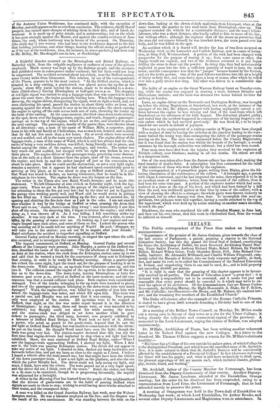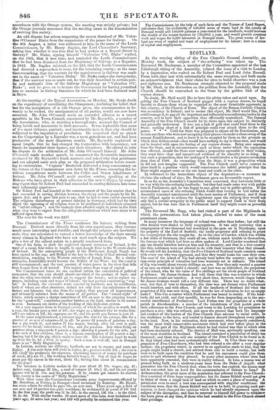IRELAND.
The Dublin correspondent of the Times thus makes an important announcement— "In pursuance of the promise of Sir James Graham, given towards the close of the last session of Parliament, a patent, granting a charter to the National Education Society, has this day passed the Great Seal of Ireland, constituting his Grace the Archbishop of Dublin, the most Reverend Archbishop Daniel Mur- ray, Franc Sadler Provost, Anthony Richard Blake, Robert Holmes, Sir Patrick Bellew, Richard Wilson Green, Pooly Shoulden Henry, D.D., John Richard Cor- ballis, barrister, Mr. Alexander M'Donnell, and Charles William Fitzgerald, com- monly called the Marquis of Kildare, into one body corporate and politic, in deed, fact, and name for ever, to be called the Commissioners of the National Education in Ireland, and empowering them to sue and be sued, &c., and to hold property not exceeding 40,000f. per annum. "It is right to state that the granting of this charter appears to be favour- ably received by all parties. The Board of Education is now 'a great fact': it is invested with a responsibility not to be overrated, and it seems but just and reasonable that every power should be conceded to it which may serve to ex- tend the sphere of its usefulness. Of the Commissioners, four are Roman Catho- lics—namely, Archbishop Murray, the Right Honourable A. Blake, Sir P. Bellew, and Mr. Corballis; two Dissenters—Dr. Henry, and Mr. Holmes, the eminent law- yer; and the remaining five members of the Established Church."
The Duke of Leinster, after the example of the Roman Catholic Primate, is stated to have given 500/. towards founding a Divinity hall in one of the new Colleges.
At a meeting of the Belfast Town-Council, on Monday, Dr. M`Gee made out a strong case in favour of that town as a site for the Ulster College; it being already the collegiate and commercial capital of the province. A memorial to the Lord-Lieutenant, urging the claims of Belfast, was adopted unanimously.
Dr. APHale, Archbishop of Tuam, has been writing another vehement letter to Sir Robert Peel against the new Colleges. In a letter to the Standard, Mr. Thomas O'Brien suggests a reason for Dr. M'Ilale's obstinate hostility- " His Grace has a College of his own outside his palace-gates, of which College he is the distinguished President, and which bears the sanctified name of St. Jarlath's. Now, it is quite natural to think that St. Jarlath's finances will be considerably affected by the establishment of a Provincial College! In fact (horreseo referens) Isis Grace will lose his pupils; and, what is still more melancholy to think upon, the pleasant appendage of 401. per annum each, which included classics, philoso- phy, morals, board, and washing."
Mr. Archdall, father of the County Member for Fermanagh, has been dismissed from the Deputy-Lieutenancy of that county. Another Deputy- Lieutenant, Mr. James Lendrum, attended at the Enniskillen Orange meeting; but the order for his dismissal has been suspended, owing to a representation from Lord Erne, the Lieutenant of Fermanagh, that he had attended merely to preserve the peace.
A meeting of Orangemen was held in the Town-ball of Enniskillen on Wednesday last week; at which Lord Enniskillen, Sir Arthur Brooke, and several other Deputy-Lieutenants and Magistrates, were in attendance. In accordance with the Orange system' the meeting was strictly private; but the Orange journals announce that the meeting came to the determination Cif reviving this society.
An odd dispute has arisen respecting the recent dismissal of Mr. Valen- tine O'Connor Blake from the commission of the peace for Galway. On the 8th August, a letter was addressed to him, in the name of the Lords Commissioners, by Mr. Henry Sugden, the Lord Chancellor's Secretary, asking him whether it was true that he had spoken at a Repeal dinner in ettlway? Mr. Blake, signing himself "Valentine O'C. Blake" replied, en the 13th, that it was true; and reminded the Lords Commissioners that he had been dismissed from the Magistracy of Galway, as a Repealer, 1843. Mr. Sugden rejoined, on the 22d, that the Lords Commissioners bad directed a supersedeus to issue, for the remaining county; at the same timeremarking, that the warrant for the appointment in Galway was made out in the name of "Valentine Blake." Mr. Blake makes the surrejoinder, that if the warrant was so made out, he was duly described in certain pub- lic and authentic lists of the Galway Magistracy as "Valentine O'C. Blake "; and he goes on to lecture the Government for having permitted him to exercise in Galway functions for which he had been declared unfit in Mayo.
At the meeting of the Repeal Association, on Monday, Mr. Steele dwelt MI the expediency of conciliating the Orangemen; declaring his belief, that but for the instigations of a vile Orange press, the consummation so de- voutly to be wished, the amalgamation of all parties, would ere now have oeourred. Mr. John O'Connell made an extended allusion to a recent squabble in the Town-Council, occasioned by Mr. Reynolds, a member of the Association; who, in resisting a borough-rate, accused the Council of tieing lavish and inaccurate in their accounts. It was deplorable that some of the most virtuous, patriotic, and inestimable men in that city should be subjected to the imputation of peculation. He conceived that an attack on the Corporation by a Repealer was a most gratuitous act, and had been productive of the most disastrous results. Mr. Reynolds explained at equal length, that he had charged the Corporation with inaccuracy, not fraud; he impeached their figures, not their intentions. He offered to refer his dispute to the arbitration of Mr. John O'Connell himself. Mr. John O'Connell made another speech, to counteract the favourable impression produced by Mr. Reynolds's frank manner; and asked why that gentleman had not adopted sonie such plan as the proposed arbitration before resort- ing to extremities. " Captain " Broderick delivered a long commentary on the letters of the Commissioner sent down by the Times; censuring the hi- vidious comparisons made between the Celtic and Saxon inhabitants of Ireland. Mr. John O'Connell made another oration, speaking at the Bishops who have given in their adhesion to the new Colleges, by expres- sing regret that Sir Robert Peel had succeeded in casting delusion into some very influential quarters-
Sir Robert Peel hail boasted at the commencement of the late session that he had succeeded in sowing division between the clergy and the people by his Be quests Act; and it gave hiin pain to say, that he had to some extent succeeded. The religions disturbances at present existing inGermany, which had for their
i object the uprooting of all religion, were to be attributed to ndividuals educated its "infidel colleges "; and the example thus afforded ought to prove to the Irish what they were to expect from the collegiate institutions which were about to be inflicted upon them. The rent for the week was 221/.
The Commissioner of the Times continues his letters; writing from Donegal. Derived more directly from his own experiences, they become much more interesting and forcible; and though the subjects are inevitably stale, they are calculated to extend a better knowledge of the facts among many classes in England who have not read much upon the subject. We give a few of the salient points in a greatly condensed form.
One of his facts, to show the neglected natural resources of Ireland, is the Want of a canal, four miles in length, to open Lough Erne to the Western shores Of Ireland. By the enterprising people of the North-east, Lough Neagh has Been opened to the sea' and Belfast is the key to the whole of that internal com- Munication, reaching to the Western extremity of Lough Erne. By a similar enterprise, Enniskillen would become the Belfast of the West: but the canal is still uncommeneed; and the vast amount of water-power in the river that falls from Lough Erne is all wasted. This neglect arises from want of capital.
The Commissioner takes for one cardinal datum the calculation of political economists that the rent should absorb one-third of the produce of land; and that the other two-thirds should go to support the farmer, and to replace ex- penses, including seeds and wages of labour; the last portion constituting " capi tal." In Ireland, the excessive rents exacted by landlords and by middlemen, both of whom are often absentees, deduct not only from the subsistence of the flamer and labourer, but also from the capital; thus prevent all improvement, and ultimately subtract from the means of all parties. The " tenant-right " of Ulster, which secures a charge sometimes of 101. an acre to the outgoing tenant for the "good-will," constitutes another burden on the land, similar in its nature to rent. Instances are shown of-the working of this high-rent system. On a very superior farm in Donegal county, of which the produce is worth 301. a year, the tenant pays a rent of 10/.; his wages as a labourer (for he works him- self) are taken at 10/., his expenses are 91., and his profit qua farmer is just IL In the same neighbourhood, a labourer pays 30s. rent for his cottage, 30s. for a quarter of an acre of conacre-31. in all: he grows 32 pounds of potatoes a day, has a pig worth 41., and makes 71. 16s. wages; leaving, after his rent is paid, assets for his family subsistence, 8/. 16s., and the potatoes. But when living on potatoes alone, a man needs 8 pounds a day: allowing 6 pounds for the wife, and for each of four children, there is a human consumption of 26 pounds a day; leaving but 6 for the pig, which ought to have 20. The deficiency must be made u p from the 3s. 4d. a week in money. Such a man is well off; and in Donegal there lane" Molly 31aguireism."
In Leitrim, matters are different: landlords are not in repute, and rents are higher. A ten-acre farm will yield in butter, &c., produce worth 201.' the rent is 10/. (half the produce); the expenses, (including interest of money for purchase of stock, 3L) are 71. i the working farmer's wages, 9/. Out of that 9l. wages he must pay the excess in the rent, about 61.; leaving him about 31. remuneration for the year!
The labourer in Leitrim makes in the year about 3/. 18s. wages; pig, 41.; deduct rent, (cottage 21. 10s, a rood of conacre 21. 103.) 51., and his net yearly
come will be 21. 18s. and the potatoes. If he cannot get conacre he starves. 'This county is the centre of" Molly Maguireism." • With these cases the Commissioner contrasts some improvements effected by Mr. Hamilton, at Pettigo, in Donegal-land reclaimed by draining. Mr. Remit.- ton rents a farm for which he pays 18s. an acre rout. Three years ago, a field of one acre and 18 perches was quite worthless; he reclaimed it at a cost of 18/. 10cL In, the first year, the profit was IL 9s. 2d.; in the second, 13L 16s. ' • in the third, 91. 2s. 8d, With similar results, 20 more acres of this. farm were reclaimed two years ago; 50 acres last year; and 150 will probably be reclaimed.this year. The Commissioner, by the help of such facts and the Tenure of Land Report. calculates that the reclaiming of 150,000 acres of waste land in the county * Donegal would add 150,000 guineas a yearrental for the landlords, would increase the wealth of the tenant-farmers by 750,000/ a year, and would provide constant work and wages for 6,390 labourers in Donegal alone. The great wants of Ire: land are want of capital and want of employment for its labour: herein a mine, of capital and employment.



























 Previous page
Previous page